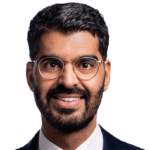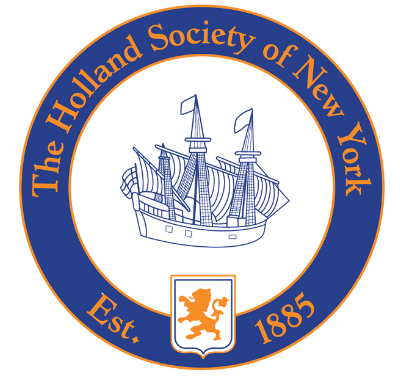Interview with Ahmed Dadou, Consul General of the Kingdom of the Netherlands in New York
Ahmed Dadou, Consul General of the Kingdom of the Netherlands in New York, will be the recipient of the 2024 Gold Medal for Distinguished Achievement for his Diplomatic Contributions to the City of New York at the Holland Society of New York’s 134th Dinner Dance.
About Our Medalist
 Ahmed Dadou has been the Dutch Consul General in New York since 2022. As Consul General, Ahmed Dadou represents the government of the Netherlands in the north-east United States. His office promotes Dutch art and culture in the US and supports Dutch entrepreneurs doing business on the East Coast. Ahmed has over 15 years of experience within the Dutch diplomatic service, including postings in Pakistan, Afghanistan, and Austria. He served as spokesperson and chief of staff for several Dutch foreign ministers. Alongside his legal studies and career, Ahmed developed activities to empower socio-economically disadvantaged children in the 4 major cities of the Netherlands. Thanks to his dedication to give back, Ahmed has built, and maintains, an extensive and diverse network in all areas of Dutch society and beyond. Mr. Dadou has a Masters in International and European Law from the University of Amsterdam. He also obtained a Diplôme d’administration publique from the Université Pierre Mendes France (UPMF).
Ahmed Dadou has been the Dutch Consul General in New York since 2022. As Consul General, Ahmed Dadou represents the government of the Netherlands in the north-east United States. His office promotes Dutch art and culture in the US and supports Dutch entrepreneurs doing business on the East Coast. Ahmed has over 15 years of experience within the Dutch diplomatic service, including postings in Pakistan, Afghanistan, and Austria. He served as spokesperson and chief of staff for several Dutch foreign ministers. Alongside his legal studies and career, Ahmed developed activities to empower socio-economically disadvantaged children in the 4 major cities of the Netherlands. Thanks to his dedication to give back, Ahmed has built, and maintains, an extensive and diverse network in all areas of Dutch society and beyond. Mr. Dadou has a Masters in International and European Law from the University of Amsterdam. He also obtained a Diplôme d’administration publique from the Université Pierre Mendes France (UPMF).
Executive Director, Sarah Cooney’s interview with Ahmed Dadou
Sarah Cooney: When and what was your first experience visiting New York City?
Ahmed Dadou: I visited New York more than 20 years ago for the first time, and I was blown away by the city’s vibrant energy. I returned many times working for the Minister of Foreign Affairs, and the city’s diversity, history, and open-mindedness continued to captivate me. A true capital of the world. When the position of Consul General opened up, I knew this was the place for me. I feel privileged to represent the Kingdom of the Netherlands in a city that has so much Dutch DNA.
SC: What has struck you most about the Dutch heritage of New York?
AD: The most striking aspect of Dutch heritage in New York is its profound and lasting impact. From the early architecture and street names to the foundational role of New Amsterdam, Dutch contributions are deeply embedded in the city’s history and identity, shaping New York into the global metropolis it is today. As Consul General I also have the privilege of engaging with people from all sorts of backgrounds and walks of life, bringing this history to the present and highlighting unheard stories and new perspectives. Dutch history is not only about the past; it continues to develop.
SC: The Holland Society’s mission is to collect and preserve the history of New Netherland and New Amsterdam. Even though New Netherland has made a lasting impact on New York City, many New Yorkers don’t know much about New Amsterdam. What would you like to tell them?
AD: I would highlight that New Amsterdam was a vibrant and innovative settlement that laid the groundwork for many aspects of modern New York City. Its early trade practices, diverse population, and progressive governance set the stage for the city’s growth and global influence. At the same time, New Amsterdam and New Netherland, like other colonies of its day, was built in part by enslaved people. We cannot change the past, but we can face up to it.
SC: What would you wish more Americans knew about the Dutch and the relationship between the US and the Netherlands?
AD: There is a deep and enduring partnership between our nations, built on shared values of democracy, innovation, and mutual respect. The Dutch have been integral to American history and continue to play a significant role in fostering economic and cultural exchanges. Since our first salute to a newly independent United States on November 16, 1776, we have been important economic partners and strong allies. And not to forget, “cookie,” “dollar,” and “landscape” are words Americans use every day, all deriving from Dutch influence.
SC: To the Holland Society’s membership, you are the personification of the deep common values of the Netherlands and the United States. How would you describe the common values and Dutch-American relations today?
AD: Dutch-American relations today are defined by a strong alignment of values, such as democracy, human rights, and a commitment to addressing global challenges together. Our shared values of openness, innovation, and cultural exchange continue to strengthen our partnership. Dutch-New York connections run deep: our economic ties, our sustainability goals, our values of diversity and democracy, and our close cultural connections. Our trade relationship has grown to the point where our trade and investment with one another supports 1 million jobs in the United States. We’re the United States’ third largest source of foreign direct investment, after Japan and the UK.
SC: In 2009, NY400 celebrated the arrival of Henry Hudson and the Half Moon in New York. 2024 marks the 400th year since Dutch settlers arrived in what is now New York City. What has changed in terms of focus?
AD: Standing apart from 2009’s celebration of Henry Hudson’s arrival in New York, FUTURE400 provides an opportunity to tell the unique history of New York in fresh ways, incorporating perspectives that go beyond the standard narrative. And this is done by working together with creative minds from all walks of life who make us see the same story from different angles.
SC: With New York’s Quadricentennial, marking the 400th year since the Dutch settlers’ arrival in what is now New York City, we highly value your leadership in the FUTURE400 program. What would you like to share with us about the program?
AD: The FUTURE400 program is designed to honor our rich history while addressing complex issues raised by that history. It aims to provide a more inclusive understanding of New Amsterdam and New York, sparking conversations that can hopefully benefit our future interactions and collaborations.
SC: What parts of New Netherland history most intrigue you?
AD: I’m learning every day about 400 years of Dutch-New York history and how we must confront it. Yes, European colonists became new trading partners for many Native Americans. But they also brought war, disease, and displacement. They disrupted the lives of indigenous people. We see that history and understand the pain of those communities. Our hope is that through acknowledging history, honestly and fully, we can better inform how we live today. And how we wish to live tomorrow
SC: What do you wish for strengthening the relationship between the US and the Netherlands in the next 100 years?
AD: The world faces many challenges: climate, urbanization, and technology. I hope for a continued and deepened partnership between the Netherlands and the US, focused on innovation, sustainability, and freedom. Cultural exchanges can be instrumental in these efforts. Strengthening knowledge exchange and economic ties will ensure our nations continue to benefit mutually and maintain a robust relationship.
SC: You and your wife recently welcomed your firstborn son. Congratulations! Born in New York, he is a New Yorker with Dutch and Moroccan roots. What part of being a New Yorker do you hope to ingrain in him when he grows up?
AD: I hope he embraces New York City’s dynamic spirit, the openness to diverse ideas and cultures, the resilience, and the drive for excellence. These traits are integral to the city’s character and will help him navigate an ever-evolving world and contribute to it. I also hope that this city teaches him to be proud of his many cultures, because New York shows the true meaning and value of having hybrid identities.
SC: What is your favorite place in New York City?
AD: Being a runner and a biker, I would say the Hudson River Greenway on the west side of Manhattan. It’s remarkable how revitalization of this part of the city came together so perfectly.

